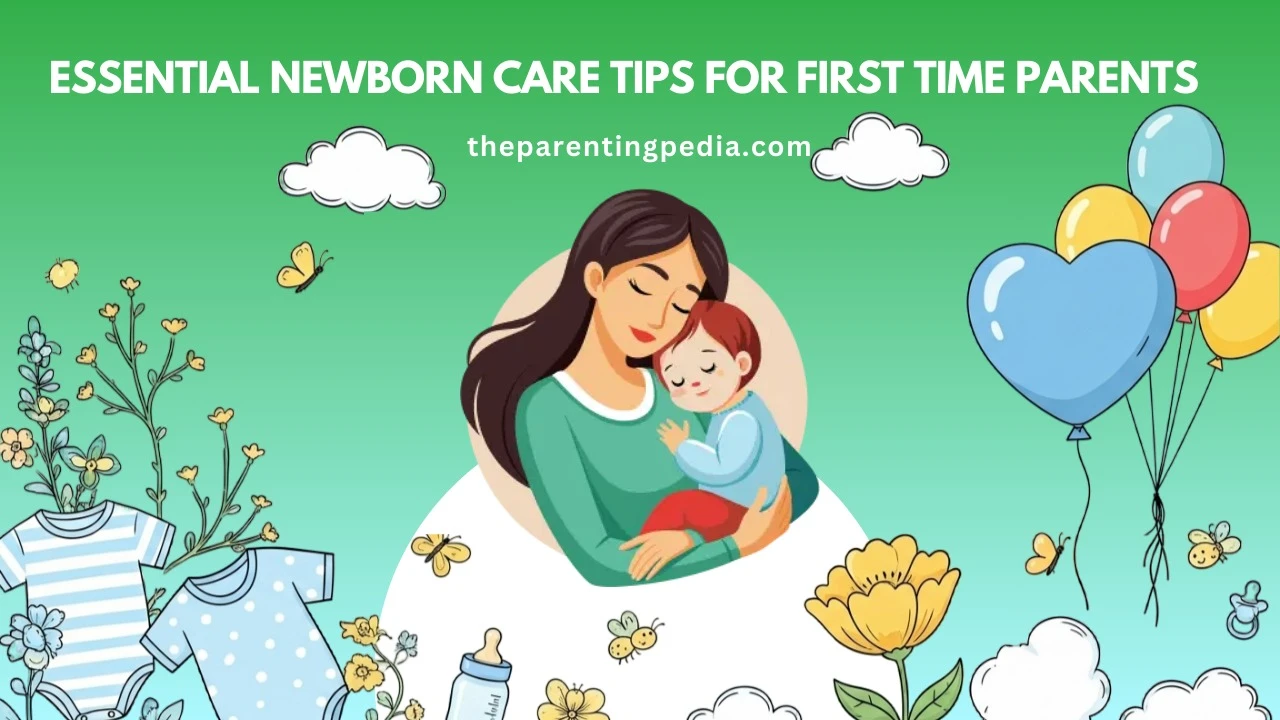Welcoming a baby into the family is one of life’s most beautiful experiences, but it can also feel overwhelming especially for first time parents. The early days are filled with joy, but also with questions, doubts and sleepless nights. Learning about newborn care helps parents feel more confident and ensures their baby’s healthy growth and development. This article explores essential newborn care tips for first time parents, covering feeding, sleep, hygiene, bonding and more all in a simple, practical way.
Understanding The Basics Of Newborn Care
Newborns are tiny, delicate and dependent on parents for every need. During the first few months, babies require round-the-clock attention. Newborn care involves not just meeting basic needs like feeding and sleep but also creating a safe, loving environment where the baby can grow. Parents often feel anxious, wondering if they are doing it right. The truth is, there is no perfect way to parent. By focusing on consistency, patience, and love, parents can handle the challenges of these early weeks more smoothly.
📸➡️ “One click, one link — make your images shareable with Imagelink.online”
Feeding the Newborn
Feeding is one of the most important parts of newborn care, as babies need nourishment frequently due to their tiny stomachs. On average, newborns feed every two to three hours and parents should watch for early hunger cues like sucking on hands, turning toward the breast or becoming fussy rather than waiting for the baby to cry. Here are some common ways:
- Breastfeeding: Provides the best nutrition, strengthens the immune system and builds a strong bond between mother and baby. It may take time for both mother and child to adjust, so patience is key.
- Formula feeding: A safe and nutritious option for babies who are not breastfed. Parents should follow the instructions carefully for preparation and feeding amounts.
- Burping after feeds: It is essential to help release swallowed air and prevent discomfort in babies.

Ensuring Safe and Comfortable Sleep
Sleep is vital for newborns as it supports brain growth and physical development. Babies sleep around 14–17 hours a day, but not all at once. For effective newborn care, parents should create a safe and calming sleep environment. Establishing a bedtime routine such as dimming lights, singing a lullaby or draping baby helps signal to the baby that it is time to rest. Here are simple ways to make a baby sleep comfortably:
- Always place the baby on their back to sleep.
- Use a firm mattress with a fitted sheet.
- Avoid pillows, blankets or stuffed toys in the crib.
- Keep the room quiet, dim and at a comfortable temperature.
Hygiene and Diapering
Proper hygiene is an important part of newborn care. Babies have sensitive skin that requires gentle handling. Here are some ways to take care of a baby’s hygiene:
- Bathing: A sponge bath is recommended until the umbilical cord stump falls off. After that, parents can give the baby a gentle bath two to three times a week.
- Diaper changes: Newborns may need 8–12 diaper changes daily. Keeping the diaper area clean and dry helps prevent rashes.
Also Read: Adoptive Parenting: Common Difficulties and Hurdles
- Nail care: Babies nails grow quickly and can scratch their skin. Parents can use baby nail clippers or a soft file to keep them short.
- Fragrance free products: Gentle, fragrance-free products should be used for bathing and skincare.
Bonding and Emotional Connection
Bonding is the emotional connection between parent and child, and it is just as important as physical newborn care. Through bonding, babies feel loved, secure and safe. When babies feel secure, they develop trust and confidence laying the foundation for healthy emotional growth. Ways to bond with a newborn include:
- Holding and cuddling often.
- Maintaining skin to skin contact.
- Talking, singing or humming to the baby.
- Responding promptly to cries.

Understanding Baby’s Cues
Every baby communicates through cues, not words. Learning these cues is an essential part of newborn care. By paying attention, parents can meet needs before they turn into full blown cries, which makes caring for the baby easier and builds trust. Here are examples of common baby cues:
- Hunger: Sucking motions, turning head, fussiness.
- Tiredness: Yawning, rubbing eyes, looking away.
- Discomfort: Crying, arching back, restlessness.
Health and Wellness Checkups
Regular health checkups are an important part of newborn care. Pediatric visits allow doctors to monitor growth, track milestones and ensure vaccinations are given on time. Parents should keep track of:
- Baby’s weight and growth patterns.
- Feeding habits and bowel movements
- Any signs of illness such as fever, rash or persistent crying.
- Prompt medical attention helps prevent complications and ensures the baby stays healthy.
🎁 Take Quick Offers, Grab Your Reward Instantly!
Managing Parental Stress
Caring for a newborn is rewarding but also exhausting. Parents often experience sleepless nights, hormonal changes and emotional ups and downs. Stress management is a hidden but crucial aspect of newborn care. When parents care for themselves, they are better equipped to care for their baby. Here are ways parents can manage stress while caring for their baby:
- Parents should rest when the baby sleeps.
- Accepting help from family and friends can lighten the load.
- Taking short breaks, even 10 minutes of fresh air can make a difference.
- Open communication between partners strengthens teamwork.
Safety at Home
Creating a safe environment is another key part of newborn care. Babies are fragile and need protection from hazards. Here are simple safety measures for babies:
- Keep small objects, cords and choking hazards away.
- Never leave a baby unattended on beds, sofas or changing tables.
- Use a properly installed car seat during travel.
- Avoid exposure to smoke and strong fragrances.
- Simple safety measures give parents peace of mind while protecting the baby.
Building a Support System
First time parents often feel isolated. Having a support system makes newborn care more manageable. Relatives, friends, parenting groups and even online communities provide guidance, reassurance and encouragement that first time parents need. Sharing experiences helps parents realize they are not alone in their struggles. Support systems also reduce stress and improve confidence in parenting skills of new born parents.

Conclusion
Newborn care may seem overwhelming at first, but with patience, love and the right knowledge, parents quickly gain confidence. From feeding and sleep routines to hygiene, bonding and health checkups, every small action contributes to a baby’s healthy development. First time parents should remember that there is no perfect way to care for a newborn. Mistakes are part of the learning journey. What matters most is creating a safe, nurturing and loving environment where the baby can grow and develop. By following these newborn care tips, parents not only support their child’s physical and emotional well being but also build a stronger bond that lasts a lifetime.
Kickstart your journey with this practical guide to profitable business ideas.
FAQ
How to care for a newborn at home?
Caring for a newborn at home involves feeding every 2–3 hours, ensuring safe sleep on their back, maintaining hygiene through regular diaper changes and gentle baths and creating a calm, loving environment. Parents should watch for hunger or discomfort cues and seek medical advice if any health concerns arise.
What is the first step in the care of the newly born infant?
The first step in the care of a newly born infant is ensuring immediate warmth and breathing. The baby should be dried gently, placed skin to skin on the mother’s chest and kept warm. Checking vital signs like breathing and heart rate ensures stability before initiating breastfeeding and further newborn care practices.
What is the 40 day rule for newborns?
In the Middle East, resting 40 days after having a baby is customary in Jordan, Lebanon, Egypt and Palestine. During this 40-day period, someone comes to the house or stays with the new mother to take care of the baby, the house and the other children, so that all new mothers have to do is rest.
What is the 15 minute rule for newborns?
This method involves putting your baby down for bed even if they are crying. In this method, you allow your baby to cry and check in on them at set time intervals (e.g., every 5, 10, 15 minutes). These intervals gradually get longer, allowing your baby to do the work of soothing themselves.
How to be a good mum to a newborn?
Each time you talk to them, sing to them, look into their eyes, respond to sadness with warmth, love and reassurance you are meeting their needs. Other moments that help a baby make healthy brain connections include being touched, stroked, rocked, fed, cuddled and comforted.
Tired of messy uploads? 🚀 Convert your images into instant shareable links in just 1 click 👉 https://imagelink.online
